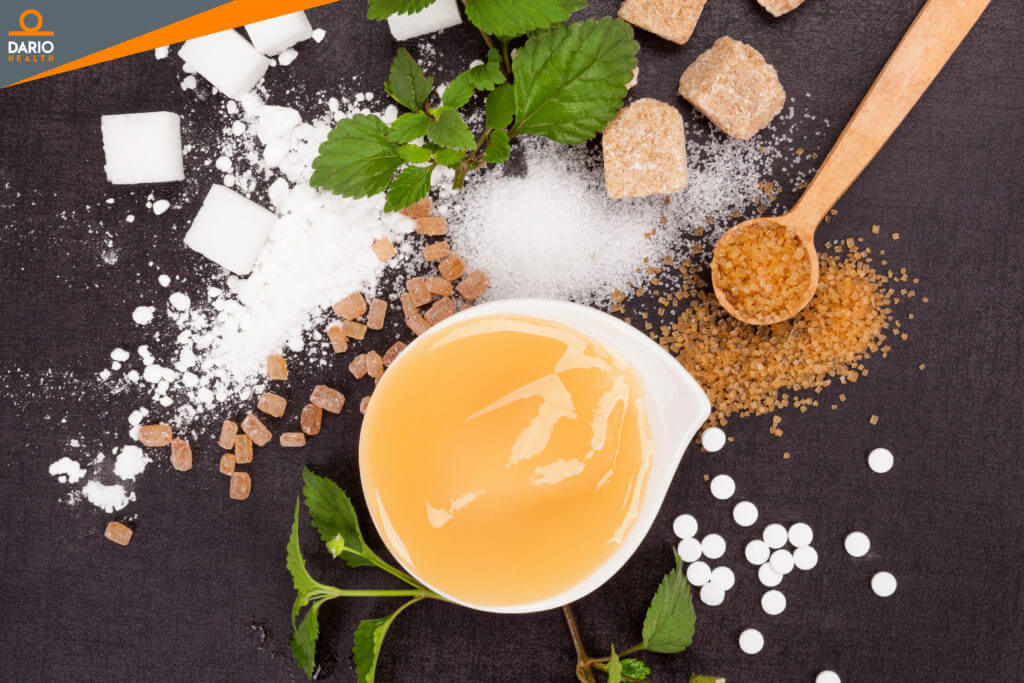So Many Sweeteners, Which to Choose?
With so many sugar substitutes on the market, it can be difficult to decide which to use. Our guide breaks down what’s behind all the sugar substitutes out there.

By Susan B. Sloane, BS, RPh, CDE
Besides sugar, there are a variety of ways to sweeten foods that perhaps have little or no impact on blood sugars. Certainly, people with diabetes can have sugar-sweetened foods when incorporated into a healthy diet plan, but other available sweeteners can be helpful to aid in keeping calories and blood sugars in control.
Let’s break it down. There are two categories of sweeteners available other than sugar: nutritive (have some impact on blood sugars and contain calories) and non-nutritive or artificial sweeteners (generally do not affect blood sugars).
Nutritive sweeteners include:
- Agave Nectar: Made from the agave plant. One teaspoonful has 21 calories and about 5 grams of carbohydrate. Although the glycemic index (ability to raise blood sugars) of agave is low, you need to be aware of calorie content when incorporating agave into a meal. It is sweeter than table sugar.
- Honey: Honey has no preservatives and is actually a preservative of sorts. Honey has about 21 calories per teaspoonful and about 6 grams of carbs.
- Coconut sugar: This sugar is made from the sap of the coconut tree. It contains 70 percent table sugar and some fiber as well. One teaspoonful has 15 calories and 5 grams of carbohydrate.
- Sugar Alcohols: Sugar alcohols, including mannitol, xylitol, maltitol, and erythritol, are used in sugar-free products. They have some but little caloric value and do not cause acute spikes in blood sugars. They do have a side effect of causing stomach issues such as bloating and diarrhea when consumed in excess.
Non-nutritive Sweeteners:
- Stevia: Stevia comes from a small bushy shrub native to Paraguay and Brazil. The good thing about stevia is it is heat stable and can be used in most recipes except for yeast breads. One cup of stevia clear liquid is equal to 1 cup of sugar. Stevia is about 30 times sweeter than sugar.
- Aspartame: Aspartame first came onto the scene receiving initial FDA approval in 1981, branded under the Nutrasweet (R) label. It has been studied extensively for safety and is one of the most studied food additives. The safety of this product has been reaffirmed in numerous studies to date.[1] Any sweetener consumed should be consumed in moderation; nothing should be consumed in excess. As always, read the relevant studies and make your own conclusion and choices for what works for you. (Maximum consumption: no more than 75 packets /day)
- Saccharin: This compound was first discovered in 1878 and up until 1981 was the only artificial sweetener available. Although it was found that saccharin was a potential carcinogen based on rat studies, the FDA found that these studies did not pertain to humans and in December 2000, the warning label for saccharin pertaining to cancer was lifted. [2] (Maximum consumption: no more than 45 packets/day.)
- Sucralose: Sucralose is made from sugar, is 600 times sweeter than sugar, but does not affect blood sugar levels. It has a good safety profile and can be used in cooking. As with all sugar substitutes, sucralose has been linked to obesity as well.[3] It is made by a chemical reaction of sucrose and chlorine. Another caveat is that certain byproducts produced when heating sucralose have been questioned by critics as potentially harmful. We will await further studies.
Hopefully, this will help you to make informed choices when choosing sweeteners. Recent studies have shown that there is a possibility that artificial and non-nutritive sweeteners can lead to changes in blood vessels that can be harmful and also potentially lead to weight gain as well.[4] Remember, as most things in life, use sweeteners in moderation!
About Susan Sloane
Susan B. Sloane, BS, RPh, CDE, has been a registered pharmacist for more than 29 years and a Certified Diabetes Educator for most of her career. Her two sons were diagnosed with diabetes, and since then, she has been dedicated to promoting wellness and optimal outcomes as a patient advocate, information expert, educator, and corporate partner.
Susan has published numerous articles on the topic of diabetes for patients and health care professionals. She has committed her career goals to helping patients with diabetes stay well through education.
<b>Medical Disclaimer</b>
The articles provided on this website are for informational purposes only. In addition, it is written for a generic audience and not a specific case; therefore, this information should not be used for diagnostic or medical treatment. This site does not attempt to replace the patient-physician relationship and fully recommends the reader to seek out the best care from his/her physician and/or diabetes educator.
[1] Calorie Control Council: Leading scientists around the world confirm safety of aspartame [article online]. Available from http://www.caloriecontrol.org/pressrelease/leading-scientists-around-the-world-confirm-safety-of-aspartame. Accessed 25 April 2018
[2] National Cancer Institute: Artificial sweeteners and cancer [article online]. Available from http://www.cancer.gov/cancertopics/factsheet/Risk/artificial-sweeteners. Accessed 27 April 2018
[3] https://www.nature.com/news/sugar-substitutes-linked-to-obesity-1.15938
[4] Experimental Biology 2018. “The Influence of Sugar and Artificial Sweeteners on Vascular Health during the Onset and Progression of Diabetes,” Accessed April 24, 2018. https://plan.core-apps.com/eb2018/abstract/382e0c7eb95d6e76976fbc663612d58a
DAR -0038 RevA 06/2019